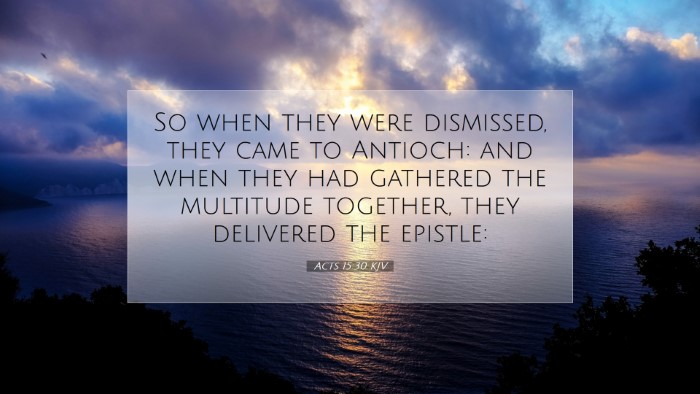Commentary on Acts 15:30
Acts 15:30 states: "So when they were sent away, they went down to Antioch; and having gathered the multitude together, they delivered the letter."
Contextual Background
This verse is pivotal in understanding the early Church's struggle with the integration of Gentile believers and the Mosaic Law. The council at Jerusalem had convened to discuss the pressing issue of whether Gentiles should be required to follow Jewish law to be accepted as Christians. The decision reached was significant, impacting both the Jewish and Gentile believers.
Summary of Public Domain Commentaries
Matthew Henry's Commentary
Matthew Henry emphasizes the importance of the letter's contents and how it served to maintain unity in the body of Christ. He notes that the apostles and elders acted in accordance with the Holy Spirit, understanding their responsibility to guide the church without imposing unnecessary burdens. Henry highlights the pastoral care evident in the letter, which reassured the Gentiles of their acceptance in Christ without the full weight of the law.
Key Insights from Henry:
- The Role of the Church Leaders: They were charged with delivering not just information but also fostering unity and peace among the believers.
- Importance of Communication: The act of gathering the multitude reinforced the communal aspect of faith and decision-making.
- The Nature of the Message: Affirming salvation through grace alone, while also acknowledging the significance of moral conduct.
Albert Barnes' Notes on the Bible
Albert Barnes focuses on the procedural aspects of the letter's delivery and its implications for the Gentile Christians at Antioch. He argues that the decision from Jerusalem was crucial as it alleviated fears and clarified that faith in Jesus, rather than adherence to Jewish law, was central to salvation.
Key Insights from Barnes:
- Affirmation of Autonomy: The letter represents a significant affirmation of Gentile autonomy in faith practices.
- Restoration of Peace: The delivery of the letter aimed to restore peace and encourage collaborative fellowship among diverse groups within the church.
- Missionary Context: The act of sending delegates emphasizes the mission-oriented nature of the early church, focused on spreading the gospel without the constraints of legalism.
Adam Clarke's Commentary
Adam Clarke elaborates on the practical implications of the letter’s delivery. He explains that this event marked a noteworthy moment in the acceptance of Gentiles into the Christian faith, indicating a shift in the church's approach, moving from an ethnocentric viewpoint to an inclusive one.
Key Insights from Clarke:
- Symbol of Unity: The gathering at Antioch serves as a model for the entire church to promote unity and shared beliefs.
- Historical Significance: This verse signifies a turning point in Christian history, illustrating the transition from Judaism to a global faith.
- Encouragement for the Faithful: The clarity provided by the letter would encourage Gentile believers to persevere in their faith amidst potential tensions with Jewish customs.
Theological Reflections
Acts 15:30 stands as a testament to God’s guidance in the early church, illustrating how divine wisdom can create pathways for inclusivity and grace in what appeared to be insurmountable conflicts. The multi-faceted insights from the commentaries affirm the ongoing relevance of this passage to contemporary issues within the church concerning doctrinal purity, cultural integration, and the essential message of salvation through Christ.
Application for Pastors, Students, and Theologians
This verse and its accompanying commentaries offer rich ground for reflection:
- Pastoral Application: Leaders today can learn the importance of fostering unity and clarity in doctrine without compromising scriptural truths.
- Educational Insight: Students and scholars can engage with this text to explore how conflicts within faith communities can be resolved through prayerful discernment and shared authority.
- Theological Discussion: The ongoing conversation concerning grace vs. works continues to influence theological discourse; this passage serves as an anchor point.
Conclusion
Acts 15:30 encapsulates the church's early struggles with identity and unity. The insights derived from Matthew Henry, Albert Barnes, and Adam Clarke converge to illuminate the profound implications of the apostles' decision. In an ever-diversifying Christian context, the principles of grace, community, and communication remain crucial for discipleship and faith practice. Thus, this verse resonates through the ages, calling contemporary believers to uphold the inclusiveness of the gospel while staying true to its foundations.


